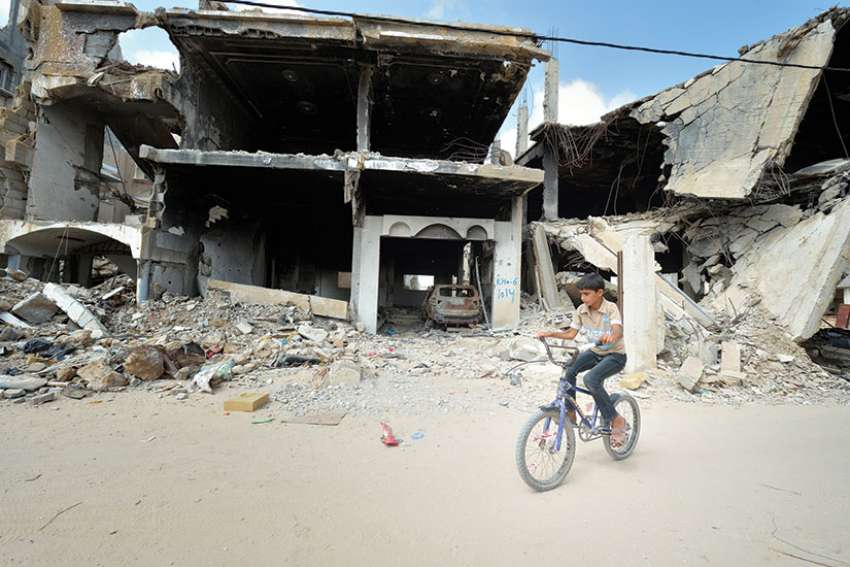Greg Rogers gets the attention of some 50 high-school age Catholic leaders using a classic call-and-response technique. He is one of the minds behind the Catholic Graduate Expectations guidelines which since 1998 have helped shape Catholic education in Ontario.
The students respond immediately, “Hey! Hey! Hey! Listen Up! Listen Up!”
For the past nine years or so I have participated in the Catholic Leadership Camp held the last week of every August near Huntsville, Ont. These young people will serve as student helpers and session leaders at the When Faith Meets Pedagogy biennial youth forum in the fall, where I will also be a guest speaker. The youth forum, now in its sixth year, brings together more than 1,500 youth from 17 Catholic school boards.
So what was I to tell these young people, so full of energy and idealism? Over time in my line of work, one develops a dogand- pony routine. Certain stories, phrases, lines that are used again and again in presentations to convey the mission of the organization I work for, Development and Peace. But for these young Catholic leaders, I adopted a new approach.
“I would like to tell you something about the person in charge at Development and Peace,” I said. “The person in charge of our mission is a heartbreaker.”
Teenagers understand heartbreak. Many raised their hands when I asked if anyone among them has had their heart broken. When I asked how their hearts were broken the answers were predictable.
“I was abandoned,” said one.
As I explored this with them further they acknowledged that it is not abandonment itself that causes heartbreak, but the fact that it is a beloved who abandons us.
We were gathered outdoors, nature all around us. This meant I had to substitute my usual projector and PowerPoint presentation with a small whiteboard and marker. I scribbled the name of the D&P heartbreaker and kept it hidden from the students. Then I asked them to guess who it was.
I turned the board to face them. In black and white letters I’d written: God.
God is in charge of the mission entrusted to D&P and God is a heartbreaker.
In this line of work — seeking to put an end to global poverty and injustice — there is no shortage of heartbreak.
First there is love. We see the beauty of God’s creation. We learn of God’s love through our mother’s embrace, our father’s protection. God is all-powerful and all-loving we are told. God loves you. God IS love. We are taught to believe that we are all children of God, all seven- billion-plus of us on the planet.
So is it any wonder that our hearts break as we truly feel and contemplate human suffering that is so often needless? Each and every one of us confronts God the heartbreaker at some point. It’s as old as the psalms.
“How can our hearts not break?” I ask them.
“Here’s some heartbreak for you: I was talking to one of our Palestinian partners, a man named Omar. He told me about living through the last bombing of Gaza, his home. He told me how the children would sleep with them at night because they were afraid, but how after they would fall asleep, they would place the children in different rooms in the house, so that if a bomb fell on the house the chances of at least a few of them surviving would be higher.”
When you work for an organization where eliminating global poverty and injustice is your mission, heartbreak is the order of the day, every day.
I wanted to talk about heartbreak with these young people because they are at an age when it often first starts to happen, when we begin to try and reconcile an all-powerful and loving God with what we see in the world. And I think we need to honour the passion of that heartbreak.
“Sometimes you have to break it to see what’s inside,” I tell them.
I write something else on the whiteboard — Godisnowhere — and ask them to read it back to me.
“God is nowhere!” they chorus.
“God is now here,” says one voice.
That’s right. God is now here.
That’s what we believe — God is now here with us, calling us to be instruments of peace in the world and to heal the pain and suffering that we cause through the radical freedom that we have been given as His creatures.
I proceed to tell them about our new campaign, women at the heart of peace. We begin to plan for how they will bring the campaign to their schools.
We move from heartbreak to hope.
(Luke Stocking is Central Ontario animator with the Canadian Catholic Organization for Development and Peace.)


